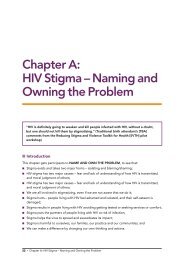Implementing Multiple Gender Strategies to Improve HIV and ... - ICRW
Implementing Multiple Gender Strategies to Improve HIV and ... - ICRW
Implementing Multiple Gender Strategies to Improve HIV and ... - ICRW
You also want an ePaper? Increase the reach of your titles
YUMPU automatically turns print PDFs into web optimized ePapers that Google loves.
TAP AND REPOSITION YOUTH (TRY)<br />
LEAD ORGANIZATIONS:<br />
COUNTRY:<br />
<strong>HIV</strong> PROGRAM AREA:<br />
Population Council<br />
Kenya<br />
Prevention, Care <strong>and</strong> Support<br />
OVERVIEW:<br />
TRY worked <strong>to</strong> improve adolescent girls’ reproductive health outcomes by improving their livelihood<br />
options. The project primarily targeted out-of-school adolescent girls <strong>and</strong> young women ages 16–22<br />
in low-income areas of Nairobi. It focused on microfinance, offering savings, credit, business support<br />
<strong>and</strong> men<strong>to</strong>ring related <strong>to</strong> small business management, as well as counseling around reproductive<br />
health issues such as <strong>HIV</strong> prevention <strong>and</strong> mitigation, drug <strong>and</strong> substance abuse, relationships, child<br />
rights <strong>and</strong> violence against women. TRY also convened workshops with legal experts <strong>to</strong> educate<br />
women about their rights. Three male-only groups addressed male norms <strong>and</strong> behaviors. By earning<br />
<strong>and</strong> saving, some participants were empowered <strong>to</strong> resist sexual coercion, insist on condom use <strong>and</strong><br />
refuse sex. By the project’s end, participating girls had significantly higher incomes <strong>and</strong> more assets<br />
than the control group. However, only the least vulnerable girls strongly benefited from microfinance:<br />
most needed social capital (friendships, support groups, safety, etc.) before they could benefit from<br />
microfinance assistance.<br />
BACKGROUND<br />
<strong>HIV</strong> & AIDS<br />
Program Goals<br />
TRY improved the economic <strong>and</strong> social well-being of adolescent girls in<br />
Kenya through efforts <strong>to</strong> increase income, improve control over income,<br />
build economic skills, <strong>and</strong> provide safe <strong>and</strong> supportive social networks.<br />
<strong>Gender</strong> <strong>Strategies</strong><br />
Addressed<br />
<br />
<br />
<br />
<br />
Reducing violence <strong>and</strong> coercion<br />
Addressing male norms <strong>and</strong> behaviors<br />
Increasing women’s legal protection<br />
Increasing women’s access <strong>to</strong> income <strong>and</strong> productive resources<br />
Other:<br />
Description of<br />
Intervention<br />
The overall aim of the project was <strong>to</strong> reduce adolescents’ vulnerability <strong>to</strong><br />
adverse social <strong>and</strong> reproductive health outcomes by improving their<br />
livelihood options. The project targeted out-of-school adolescent girls <strong>and</strong><br />
young women ages 16–22 residing in low-income <strong>and</strong> slum areas of<br />
Nairobi. It sought <strong>to</strong> increase their access <strong>to</strong> income by using a modified<br />
group-based microfinance model <strong>to</strong> extend integrated savings, credit,<br />
business support <strong>and</strong> men<strong>to</strong>ring <strong>to</strong> out-of-school adolescents <strong>and</strong> young<br />
women.<br />
While most existing adolescent <strong>HIV</strong> prevention efforts educate about<br />
reducing risky premarital sexual behavior <strong>and</strong> encourage participants <strong>to</strong><br />
“just say no <strong>to</strong> sex,” these efforts overlook the context of sexual behavior.<br />
The Population Council <strong>and</strong> K-Rep Development Agency (KDA) developed<br />
<strong>and</strong> tested a model <strong>to</strong> reduce economic vulnerability <strong>and</strong> increase social<br />
connectedness among girls residing in low-income <strong>and</strong> slum areas of<br />
Nairobi. The model used savings, group-based credit <strong>and</strong> adult men<strong>to</strong>rs <strong>to</strong><br />
reach young women with livelihoods <strong>and</strong> social support, as well as<br />
reproductive health information. Men<strong>to</strong>rs also periodically organized large<br />
69
















